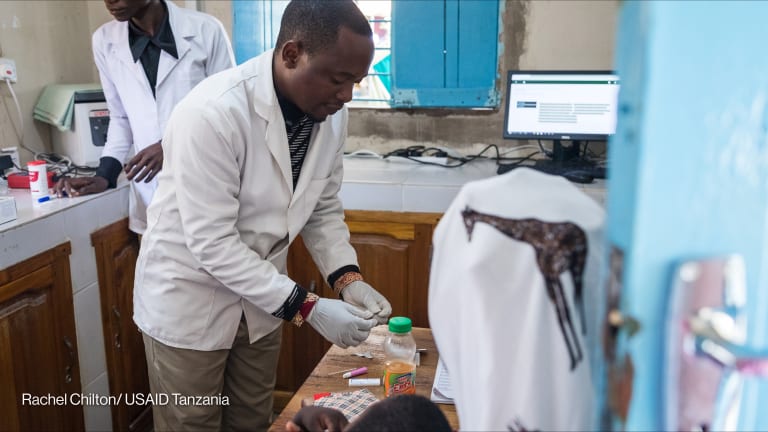Rewarding #innov8aid: Lessons from the Healthcare Innovation Award
GSK and Save the Children learned two important lessons from their first innovation award — lessons that they are incorporating in the award's second edition.
MicroClinic Technologies is on a roll. The Kenyan company made the short list of the 2014 Financial Times-International Finance Corp. Transformational Business Awards for ZiDi, a mobile application offering real-time access to health data as a way to improve diagnosis and treatment of common diseases that afflict women and children. It’s just one in a string of recognitions MicroClinic Technologies has received since winning one of the prizes under the first Healthcare Innovation Award in November 2013. The Healthcare Innovation Award is a core part of the partnership between GlaxoSmithKline and Save the Children. Last year, five organizations from the developing world split the $1 million pot, with cash grants ranging from $100,000 to $400,000. Speaking to Devex, Dr. Allan Pamba, vice president for East Africa at GSK, recalled a conversation with the people behind MicroClinic Technologies about the award’s impact on the organization. “Basically they said, ‘Look, for us, we would have been happy enough to have the money, but just the recognition that this award gave us has opened so many doors for us that we now have grown to be recognized by first of all a foreign company and the health ministry at home but also beyond the borders of the country,’” said Pamba, who will officially launch the second edition of the award this week in Johannesburg, South Africa. From being a technology “under the radar,” ZiDi is now integrated in the Kenyan national e-health platform. The Kenya Ministry of Health is working on a public-private partnership deal to license ZiDi Pro, which was developed with the award money, for use in more than 5,000 health facilities beginning in 2015. Other Healthcare Innovation Award winners also had good news to share. BRAC of Bangladesh, for instance, used its $300,000 grant to bring Manoshi, an urban maternal, neonatal and child health program equipping health care workers with mobile phone-based data collection software, to the Portee slum of Freetown, Sierra Leone, ranked among countries with the highest under-5 and maternal mortality rates. The plan is to expand the coverage to 40 other slums in the African country. “This will continue to grow and clearly we'll have huge impact on the populations in Freetown and hopefully beyond Freetown,” Pamba said. Both GSK and Save the Children deem the award a success. And they hope to improve the process even more based on lessons learned from its first edition. First, the partners want to explain more clearly what they mean by innovation. “I think many people when they hear that think about a piece of technology … they think less about an innovative process,” Pamba said. “So we want to make sure that we explain that more clearly so that we get more people applying with processes or changes put in place in times of delivery of care for children under the age of 5 that have an impact probably in small corners of the world.” Second, the award will now have a focus. The second edition specifically targets innovations that can improve the survival of infants within their first month of life, which Pamba called “a high-burden” area. The World Health Organization estimated that in 2012, nearly 3 million babies died during the neonatal period. “These are early lessons,” Pamba said. “We are still of course continuing to talk to our partners, talk to the award winners and understand how we can continue to do this better and improve it as the years roll on.” You can help shape our coverage on global development innovations. If you’d like to contribute an idea, please email news@devex.com or tweet me @DevexElizaJV using #innov8aid. Join Devex, the largest online community for international development, to network with peers, discover talent and forge new partnerships — it’s free. Then sign up for the Devex Impact newsletter to receive cutting-edge news and analysis every month on the intersection of business and development.
MicroClinic Technologies is on a roll.
The Kenyan company made the short list of the 2014 Financial Times-International Finance Corp. Transformational Business Awards for ZiDi, a mobile application offering real-time access to health data as a way to improve diagnosis and treatment of common diseases that afflict women and children. It’s just one in a string of recognitions MicroClinic Technologies has received since winning one of the prizes under the first Healthcare Innovation Award in November 2013.
The Healthcare Innovation Award is a core part of the partnership between GlaxoSmithKline and Save the Children. Last year, five organizations from the developing world split the $1 million pot, with cash grants ranging from $100,000 to $400,000.
This story is forDevex Promembers
Unlock this story now with a 15-day free trial of Devex Pro.
With a Devex Pro subscription you'll get access to deeper analysis and exclusive insights from our reporters and analysts.
Start my free trialRequest a group subscription Printing articles to share with others is a breach of our terms and conditions and copyright policy. Please use the sharing options on the left side of the article. Devex Pro members may share up to 10 articles per month using the Pro share tool ( ).
Eliza is a veteran journalist focused on covering the most pressing issues and latest innovations in global health, humanitarian aid, sustainability, and development. A member of Mensa, Eliza has earned a master's degree in public affairs and bachelor's degree in political science from the University of the Philippines.








